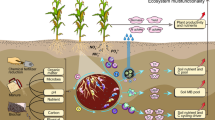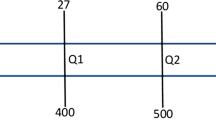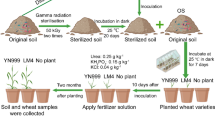Abstract
Purpose
Microbial inoculation is a promising way to improve soil fertility in an eco-friendly manner. Despite the extensive studies of microbial inoculation used for soil biofertilization, their influences on the soil resident microbial community compositions and functions remain poorly understood.
Methods
Here, we conducted a 130-day pot experiment to test the effects of single and co-inoculation of Rhodopseudomonas palustris and Bacillus subtilis on soil resident bacterial community through sequencing soil microbial 16S ribosomal RNA gene amplicons, as well as the yield and agronomic traits of the rice plant.
Results
Microbial inoculations significantly improved the rice yields by 9.84–17.73% (p < 0.05), and R. palustris and B. subtilis inoculant showed synergistic effects on rice yields. The agronomic traits of the rice plants were rarely influenced by the inoculations. We observed that the Shannon diversity of soil resident bacteria remained; however, the community composition changed profoundly with microbial inoculants. The co-inoculation with R. palustris and B. subtilis led to the shift of the relative abundances of plant growth–promoting bacteria in soils, such as Microbacter. The structural equation modeling suggested that soil bacterial community composition greatly contributed to the yield and agronomic traits of the rice plants (r = −0.36 to −0.88, p < 0.05). The soil bacterial community also indirectly mediated the plant growth by affecting microbial enzymatic activities involved in carbon and phosphorus cycling in soils.
Conclusion
In general, microbial inoculants directly and indirectly through mediating the soil resident communities enhanced the rice yields.





Similar content being viewed by others
Data Availability
The raw sequencing reads of the 16S rRNA gene were deposited in the Sequence Read Archive (SRA) at NCBI for Biotechnology Information under the accession code SUB7406273.
References
Adesemoye AO, Torbert HA, Kloepper JW (2008) Enhanced plant nutrient use efficiency with PGPR and AMF in an integrated nutrient management system. Can J Microbiol 54:876–886. https://doi.org/10.1139/W08-081
Allison LE (1965) Organic carbon. In: Norman AG (ed) Methods of soil analysis: Part 2. American Society of Agronomy, Madison, WI, Chemical and microbiological properties, pp 1367–1389
Allison SD, Jastrow JD (2006) Activities of extracellular enzymes in physically isolated fractions of restored grassland soils. Soil Biol Biochem 38:3245–3256. https://doi.org/10.1016/j.soilbio.2006.04.011
Arashida H, Kugenuma T, Watanabe M, Maeda I (2019) Nitrogen fixation in Rhodopseudomonas palustris co-cultured with Bacillus subtilis in the presence of air. J Biosci Bioeng 127:589–593. https://doi.org/10.1016/j.jbiosc.2018.10.010
Atieno M, Herrmann L, Okalebo R, Lesueur D (2012) Efficiency of different formulations of Bradyrhizobium japonicum and effect of co-inoculation of Bacillus subtilis with two different strains of Bradyrhizobium japonicum. World J Microbiol Biotechnol 28:2541–2550. https://doi.org/10.1007/s11274-012-1062-x
Bashan Y, Holguin G, De-Bashan LE (2004) Azospirillum–plant relationships: physiological, molecular, agricultural, and environmental advances (1997–2003). Can J Microbiol 50:521–577. https://doi.org/10.1139/w04-035
Boveiri Dehsheikh A, Mahmoodi Sourestani M, Zolfaghari M, Enayatizamir N (2020) Changes in soil microbial activity, essential oil quantity, and quality of Thai basil as response to biofertilizers and humic acid. J Clean Prod 256:120439. https://doi.org/10.1016/j.jclepro.2020.120439
da Costa PB, van Elsas JD, Mallon C, dos Anjos Borges LG, Pereira Passaglia LM (2020) Efficiency of probiotic traits in plant inoculation is determined by environmental constrains. Soil Biol Biochem 148:107893. https://doi.org/10.1016/j.soilbio.2020.107893
Dufrene M, Legendre P, Monographs SE, Aug N (2011) Species assemblages and indicator species: the need for a flexible asymmetrical approach. America (NY) 67:345–366
Edgar RC (2013) UPARSE: highly accurate OTU sequences from microbial amplicon reads. Nat Methods 10:996–998. https://doi.org/10.1038/nmeth.2604
Elkoca E, Kantar F, Sahin F (2007) Influence of nitrogen fixing and phosphorus solubilizing bacteria on the nodulation, plant growth, and yield of chickpea. J Plant Nutr 31:157–171. https://doi.org/10.1080/01904160701742097
Felici C, Vettori L, Giraldi E, Forino LMC, Toffanin A, Tagliasacchi AM, Nuti M (2008) Single and co-inoculation of Bacillus subtilis and Azospirillum brasilense on Lycopersicon esculentum: effects on plant growth and rhizosphere microbial community. Appl Soil Ecol 40:260–270. https://doi.org/10.1016/j.apsoil.2008.05.002
Frankeberger WT, Johanson JB (1983) Method of measuring invertase activity in soils. Plant Soil 74:301–311. https://doi.org/10.1007/BF02181348
Fuerst JA, Sagulenko E (2011) Beyond the bacterium: Planctomycetes challenge our concepts of microbial structure and function. Nat Rev Microbiol 9:403–413. https://doi.org/10.1038/nrmicro2578
García-Fraile P, Menéndez E, Celador-Lera L, Díez-Méndez A, Jiménez-Gómez A, Marcos-García M, Cruz-González XA, Martínez-Hidalgo P, Mateos PF, Rivas R (2017) Bacterial probiotics: a truly green revolution. In: Probiotics and Plant Health. Springer, Singapore, pp 131–162
Green VS, Stott DE, Diack M (2006) Assay for fluorescein diacetate hydrolytic activity: optimization for soil samples. Soil Biol Biochem 38:693–701. https://doi.org/10.1016/j.soilbio.2005.06.020
Jangid K, Williams MA, Franzluebbers AJ, Sanderlin JS, Reeves JH, Jenkins MB, Endale DM, Coleman DC, Whitman WB (2008) Relative impacts of land-use, management intensity and fertilization upon soil microbial community structure in agricultural systems. Soil Biol Biochem 40:2843–2853. https://doi.org/10.1016/j.soilbio.2008.07.030
Kantachote D, Nunkaew T, Kantha T, Chaiprapat S (2016) Biofertilizers from Rhodopseudomonas palustris strains to enhance rice yields and reduce methane emissions. Appl Soil Ecol 100:154–161. https://doi.org/10.1016/j.apsoil.2015.12.015
Kantha T, Kantachote D, Klongdee N (2015) Potential of biofertilizers from selected Rhodopseudomonas palustris strains to assist rice (Oryza sativa L. subsp. indica) growth under salt stress and to reduce greenhouse gas emissions. Ann Microbiol 65:2109–2118. https://doi.org/10.1007/s13213-015-1049-6
Khan MR, Khan N, Khan SM (2001) Evaluation of agricultural materials as substrate for mass culture of fungal biocontrol agents of fusarial wilt and root-knot nematode diseases. Tests Agrochem Cultiv 22:50–51
Kong Y (2011) Btrim: a fast, lightweight adapter and quality trimming program for next-generation sequencing technologies. Genomics 98:152–153. https://doi.org/10.1016/j.ygeno.2011.05.009
Kumar M, Singh DP, Prabha R, Rai AK, Sharma L (2016) Role of microbial inoculants in nutrient use efficiency. In: Microbial inoculants in sustainable agricultural productivity. pp 133–142
Kumar A, Maurya BR, Raghuwanshi R, Meena VS, Tofazzal Islam M (2017) Co-inoculation with Enterobacter and Rhizobacteria on yield and nutrient uptake by wheat (Triticum aestivum L.) in the alluvial soil under Indo-Gangetic Plain of India. J Plant Growth Regul 36:608–617. https://doi.org/10.1007/s00344-016-9663-5
Kumari B, Mallick MA, Solanki MK, Solanki AC, Hora A, Guo W (2019) Plant growth promoting rhizobacteria (PGPR): modern prospects for sustainable agriculture. In: Ansari RA, Mahmood I (eds) Plant health under biotic stress. Volume 2: microbial interactions. Springer, pp 109–127
Lu R (1999) Analytical methods for soil and agricultural chemistry. Agricultur, Beijing
Mäder P, Kaiser F, Adholeya A, Singh R, Uppal HS, Sharma AK, Srivastava R, Sahai V, Aragno M, Wiemken A, Johri BN, Fried PM (2011) Inoculation of root microorganisms for sustainable wheat–rice and wheat–black gram rotations in India. Soil Biol Biochem 43:609–619. https://doi.org/10.1016/j.soilbio.2010.11.031
Magoč T, Salzberg SL (2011) FLASH: fast length adjustment of short reads to improve genome assemblies. Bioinformatics 27:2957–2963. https://doi.org/10.1093/bioinformatics/btr507
Mallon CA, Le Roux X, Van Doorn GS, Dini-Andreote F, Poly F, Salles JF (2018) The impact of failure: unsuccessful bacterial invasions steer the soil microbial community away from the invader’s niche. ISME J 12:728–741. https://doi.org/10.1038/s41396-017-0003-y
Mawarda PC, Le Roux X, Dirk van Elsas J, Salles JF (2020) Deliberate introduction of invisible invaders: a critical appraisal of the impact of microbial inoculants on soil microbial communities. Soil Biol Biochem 148:107874. https://doi.org/10.1016/j.soilbio.2020.107874
Nannipieri P, Ascher J, Ceccherini MT, Landi L, Pietramellara G, Renella G (2003) Microbial diversity and soil functions. Eur J Soil Sci 54:655–670. https://doi.org/10.1046/j.1351-0754.2003.0556.x
Nassal D, Spohn M, Eltlbany N, Jacquiod S, Smalla K, Marhan S, Kandeler E (2018) Effects of phosphorus-mobilizing bacteria on tomato growth and soil microbial activity. Plant Soil 427:17–37. https://doi.org/10.1007/s11104-017-3528-y
Nunkaew T, Kantachote D, Kanzaki H, Nitoda T, Ritchie RJ (2014) Effects of 5-aminolevulinic acid (ALA)-containing supernatants from selected Rhodopseudomonas palustris strains on rice growth under NaCl stress, with mediating effects on chlorophyll, photosynthetic electron transport and antioxidative enzymes. Electron J Biotechnol 17:4–4
Oksanen J, Blanchet FG, Kindt R, Legendre P, Minchin PR, O’Hara RB, Simpson GL, Solymos P, Stevens MHH, Wagner H (2013) Package ‘vegan’. In: R Packag. ver. 2.5–2
Parastesh F, Alikhani HA, Etesami H (2019) Vermicompost enriched with phosphate-solubilizing bacteria provides plant with enough phosphorus in a sequential cropping under calcareous soil conditions. J Clean Prod 221:27–37. https://doi.org/10.1016/j.jclepro.2019.02.234
Pedraza RO, Bellone CH, Carrizo de Bellone S, Boa Sorte PMF, Teixeira KR d S (2009) Azospirillum inoculation and nitrogen fertilization effect on grain yield and on the diversity of endophytic bacteria in the phyllosphere of rice rainfed crop. Eur J Soil Biol 45:36–43. https://doi.org/10.1016/j.ejsobi.2008.09.007
Piromyou P, Buranabanyat B, Tantasawat P, Tittabutr P, Boonkerd N, Teaumroong N (2011) Effect of plant growth promoting rhizobacteria (PGPR) inoculation on microbial community structure in rhizosphere of forage corn cultivated in Thailand. Eur J Soil Biol 47:44–54. https://doi.org/10.1016/j.ejsobi.2010.11.004
Prasanna R, Joshi M, Rana A, Shivay YS, Nain L (2012) Influence of co-inoculation of bacteria-cyanobacteria on crop yield and C–N sequestration in soil under rice crop. World J Microbiol Biotechnol 28:1223–1235. https://doi.org/10.1007/s11274-011-0926-9
Rahmonov O, Cabala J, Bednarek R, Rozek D, Florkiewicz A (2015) Role of soil algae on the initial stages of soil formation in sandy polluted areas. Ecol Chem Eng S 22:675–690. https://doi.org/10.1515/eces-2015-0041
Rana K, Rana N, Singh B (2020) Applications of sulfur oxidizing bacteria. In: Physiological and biotechnological aspects of extremophiles. Academic Press. pp 131–136
Roberts DW (2013) Package “labdsv.” R Packag 1–56. https://doi.org/10.1021/es103092a.See
Roesti D, Gaur R, Johri BN, Imfeld G, Sharma S, Kawaljeet K, Aragno M (2006) Plant growth stage, fertiliser management and bio-inoculation of arbuscular mycorrhizal fungi and plant growth promoting rhizobacteria affect the rhizobacterial community structure in rain-fed wheat fields. Soil Biol Biochem 38:1111–1120. https://doi.org/10.1016/j.soilbio.2005.09.010
Schwieger F, Tebbe CC (2000) Effect of field inoculation with Sinorhizobium meliloti L33 on the composition of bacterial communities in rhizospheres of a target plant (Medicago sativa) and a non-target plant (Chenopodium, album) – linking of 16S rRNA gene-based single-strand conforma. Appl Environ Microbiol 66:3556–3565. https://doi.org/10.1128/AEM.66.8.3556-3565.2000
Trabelsi D, Mhamdi R (2013) Microbial inoculants and their impact on soil microbial communities: a review. Biomed Res Int 2013:863240–863211. https://doi.org/10.1155/2013/863240
Wang Q, Garrity GM, Tiedje JM, Cole JR (2007) Naïve Bayesian classifier for rapid assignment of rRNA sequences into the new bacterial taxonomy. Appl Environ Microbiol 73:5261–5267. https://doi.org/10.1128/AEM.00062-07
Wang S, Liang X, Chen Y, Luo Q, Liang W, Li S, Huang C, Li Z, Wan L, Li W, Shao X (2012) Phosphorus loss potential and phosphatase activity under phosphorus fertilization in long-term paddy wetland agroecosystems. Soil Sci Soc Am J 76:161–167. https://doi.org/10.2136/sssaj2011.0078
Wong WT, Tseng CH, Hsu SH, Lur HS, Mo CW, Huang CN, Hsu SC, Lee KT, Te Liu C (2014) Promoting effects of a single Rhodopseudomonas palustris inoculant on plant growth by Brassica rapa chinensis under low fertilizer input. Microbes Environ 29:303–313. https://doi.org/10.1264/jsme2.ME14056
Wu F, An YQ, An Y, Wang XJ, Cheng ZY, Zhang Y, Hou X, Chen CX, Wang L, Bai JG (2018) Acinetobacter calcoaceticus CSY-P13 mitigates stress of ferulic and p-hydroxybenzoic acids in cucumber by affecting antioxidant enzyme activity and soil bacterial community. Front Microbiol 9:1262. https://doi.org/10.3389/fmicb.2018.01262
Xiao X, Liang Y, Zhou S, Zhuang S, Sun B (2018) Fungal community reveals less dispersal limitation and potentially more connected network than that of bacteria in bamboo forest soils. Mol Ecol 27:550–563. https://doi.org/10.1111/mec.14428
Xiao X, Zhao Y, Zhou Q, Wang L, Zhang X, Zhao L, Zhang S (2019) Alleviating the cadmium toxicity and growth-promotion in paddy rice by photosynthetic Bacteria. Clean - Soil, Air, Water 47:2–7. https://doi.org/10.1002/clen.201800382
Xu J, Feng Y, Wang Y, Luo X, Tang J, Lin X (2016) The foliar spray of Rhodopseudomonas palustris grown under Stevia residue extract promotes plant growth via changing soil microbial community. J Soils Sediments 16:916–923. https://doi.org/10.1007/s11368-015-1269-1
Xu J, Feng Y, Wang Y, Lin X (2018) Effect of rhizobacterium Rhodopseudomonas palustris inoculation on Stevia rebaudiana plant growth and soil microbial community. Pedosphere 28:793–803. https://doi.org/10.1016/S1002-0160(18)60043-8
Code availability
All codes for the figures are available online (https://github.com/lax-lab/Microbial-inoculation-shifts-resident-community.git).
Funding
The project was supported by the National Natural Scientific Foundation of China (No. 42007027), the Program of Natural Science Research of Jiangsu Higher Education Institutions (19KJD610001), and Research Foundation for Talented Scholars of Changzhou University (ZMF19020312).
Author information
Authors and Affiliations
Contributions
Y.Z. and X.X. conceived and designed research. Y.S. and M.P. conducted experiments. J.F., H.J., and L.Z. contributed new reagents or analytical tools. Y.S. and X.X. analyzed data. Y.Z. wrote the manuscript. All authors read and approved the manuscript.
Corresponding author
Ethics declarations
Conflicts of interest
The authors declare that they have no competing interests.
Ethical approval
This article does not contain any studies with human participants or animals performed by any of the authors.
Additional information
Responsible editor: Jizheng He
Publisher’s note
Springer Nature remains neutral with regard to jurisdictional claims in published maps and institutional affiliations.
Supplementary Information
ESM 1
(DOCX 673 kb)
Rights and permissions
About this article
Cite this article
Zhao, Y., Sun, Y., Pei, M. et al. Enhanced rice yields are related to pronounced shifts in soil resident bacterial community structures in response to Rhodopseudomonas palustris and Bacillus subtilis inoculation. J Soils Sediments 21, 2369–2380 (2021). https://doi.org/10.1007/s11368-021-02929-8
Received:
Accepted:
Published:
Issue Date:
DOI: https://doi.org/10.1007/s11368-021-02929-8




